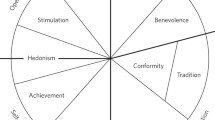Abstract
This research sought to identify the dimensional structure of values, their relationship to perceived QOL, and to examine cultural differences in value systems. A sample of 200 respondents was asked to provide direct, indirect, and importance ratings of a range of values. It was found that these could be adequately represented by seven dimensions, and that comparable dimensions were obtained from all three sets of value measures. This finding was replicated by alternative analyses, and also replicates previous research, providing strong evidence for the generality of the structure.
Some inconsistent differences in values were found between the three ethnic groups (European, Maori, and Polynesian) that comprised the sample, but it was concluded that there were no clear cultural differences in values. No cultural differences were found in QOL measures also. Some possible explanations of these results are discussed.
Value dimensions for direct and indirect value measures were found to be useful predictors of QOL, with close, personal dimensions generally being the best predictors. Value importance dimensions were not found to be useful QOL predictors, and it is proposed that future research should focus on aspiration measures.
Similar content being viewed by others
Bibliography
AndrewsF. M. and McKennellA.: 1980, ‘Measures of self-reported well-being: Their affective cognitive and other components’, Social Indicators Research 8, pp. 127–155.
AndrewsF. M. and WitheyS.: 1976, Social Indicators of Well-being (Plenum, New York).
Atkinson, T. and Murray, M.: September, 1979, ‘Values, domains and the perceived quality of life’, Paper presented to the Annual Meeting of the American Psychological Association, New York.
BeiserM.: 1974, ‘Components and correlates of mental well-being’, Journal of Health and Social Behaviour 15, pp. 320–327.
BharadwajL. K. and WilkeningE. A.: 1980, ‘Life domain satisfactions and personal social integration’, Social Indicators Research 7, pp. 337–351.
BharadwajL. and WilkeningE. A.: 1977, ‘The prediction of perceived well-being’, Social Indicators Research 4, pp. 421–439.
BradburnN. M.: 1969, The Structure of Psychological Well-being (Aldine, Chicago).
BubolzM. M., EicherJ. B., EversS. J. and SontagM. S.: 1980, ‘A human ecological approach to quality of life: Conceptual framework and results of a preliminary study’, Social Indicators Research 7, pp. 103–136.
BungeM.: 1975, ‘What is a quality of life indicator?’, Social Indicators Research 2, pp. 65–79.
BurtR. S., WileyJ. A., MinorM. J. and MurrayJ. R.: 1978, ‘Structure of well-being: Form, content and stability over time’, Sociological Methods and Research 6, pp. 365–406.
CampbellA.: 1981, The Sense of Well-being in America (McGraw-Hill, New York).
CampbellA.: 1976, ‘Subjective measures of well-being’, American Psychologist 31, pp. 117–124.
CampbellA., ConverseP. E. and RodgersW. L.: 1976, The Quality of American Life (Sage, New York).
Chamberlain, K.: 1982, Perceptions of Well-being in Palmerston North (Occasional Papers in Psychology, No. 8, Massey University).
Chamberlain, K.: August, 1984, ‘Theoretical issues in the study of well-being’, Paper presented to New Zealand Psychological Society Annual Conference, Palmerston North.
DienerE.: 1984, ‘Subjective well-being’, Psychological Bulletin 95, pp. 542–575.
d'IribarneP.: 1974, ‘The relationships between subjective and objective well-being’, in B.Strumpel (ed.), Subjective Elements of Well-being (OECD, Paris).
DuncanO. D.: 1969, Toward Social Reporting: Next Steps (Sage, New York).
ElleyW. B. and IrvingJ. C.: 1976, ‘Revised socio-economic index for New Zealand’, New Zealand Journal of Educational Studies 11, pp. 25–36.
GillinghamR. and ReeceW. S.: 1980, ‘Analytical problems in the measurement of the quality of life’, Social Indicators Research 7, pp. 91–101.
GorsuchR. L.: 1974, Factor Analysis (Saunders, London).
GoveW. R., McCorkelJ., FainT. and HughesM. D.: 1976, ‘Response bias in community surveys of mental health: Systematic bias or random noise?’, Social Science and Medicine 10, pp. 497–502.
IrvingJ. C. and ElleyW. B.: 1977, ‘A socio-economic index for the female labour force in New Zealand’, New Zealand Journal of Educational Studies 12, pp. 154–163.
KeppelG.: 1973, Design and Analysis: A Researcher's Handbook. (Prentice-Hall, Englewood Cliffs, New Jersey).
LeeT. and MaransR. W.: 1980, ‘Objective and subjective indicators: Effects of scale discordance on interrelationships’, Social Indicators Research 8, pp. 47–64.
McKennellA. C.: 1978, ‘Cognition and affect in perceptions of well-being’, Social Indicators Research 5, pp. 389–426.
McKennellA. C. and AndrewsF. M.: 1980, ‘Models of cognition and affect in perceptions of well-being’, Social Indicators Research 8, pp. 257–298.
MichalosA. C.: 1980, ‘Satisfaction and happiness’, Social Indicators Research 8, pp. 385–422.
Michalos, A. C.: 1985, ‘Multiple discrepancies theory’, Social Indicators Research, in press.
MilbrathL.: 1980, Values, lifestyles and basic beliefs as influences on perceived quality of life (Unesco, Paris) (SS/CS/18/80/5).
MoumT.: 1980, The role of values and life-goals in quality of life (Unesco, Paris) (SS/CS/18/80/2).
New Zealand Department of Statistics.: 1982, Census of Populations and Dwellings 1976: Meshblock Tabulation Output (Department of Statistics, Government Printer, Wellington).
RokeachM.: 1973, The Nature of Human Values (The Free Press, New York).
SchneiderM.: 1975, ‘The quality of life in large American cities: Objective and subjective social indicators’, Social Indicators Research 1, pp. 495–509.
VeldmanD. J.: 1967, Fortran Programming for the Behavioural Sciences (Holt, Rinehart & Winston, New York).
WassermanI. M., & ChuaL. A.: 1980, ‘Objective and subjective social indicators of the quality of life in American SMSA's: A reanalysis’, Social Indicators Research 8, pp. 365–381.
Author information
Authors and Affiliations
Rights and permissions
About this article
Cite this article
Chamberlain, K. Value dimensions, cultural differences, and the prediction of perceived quality of life. Soc Indic Res 17, 345–400 (1985). https://doi.org/10.1007/BF00290321
Issue Date:
DOI: https://doi.org/10.1007/BF00290321




